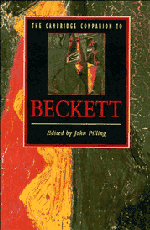Book contents
- Frontmatter
- 1 An endgame of aesthetics
- 2 Beckett's English fiction
- 3 Three novels and four nouvelles
- 4 Waiting for Godot and Endgame
- 5 Stages of identity
- 6 Beginning again
- 7 The mediated Quixote
- 8 Dead heads
- 9 Disabled figures
- 10 Beckett's poems and verse translations or
- 11 Beckett as director
- 12 Beckett's bilingualism
- 13 Beckett and the philosophers
- Further reading
- Index
5 - Stages of identity
from Krapp’s last tape to Play
Published online by Cambridge University Press: 28 May 2006
- Frontmatter
- 1 An endgame of aesthetics
- 2 Beckett's English fiction
- 3 Three novels and four nouvelles
- 4 Waiting for Godot and Endgame
- 5 Stages of identity
- 6 Beginning again
- 7 The mediated Quixote
- 8 Dead heads
- 9 Disabled figures
- 10 Beckett's poems and verse translations or
- 11 Beckett as director
- 12 Beckett's bilingualism
- 13 Beckett and the philosophers
- Further reading
- Index
Summary
Beckett's plays of the 1970s and 1980s form a well-defined grouping: we can refer to them as 'the late plays' with confidence. The pairing of Waiting for Godot and Endgame has generally proved a helpful critical move, even if these, the 'longer plays', cannot sensibly be referred to as a period grouping (they are hardly 'early'). But what of the major stage plays which come between these groupings: Krapp's last tape (1958), Happy days (1961) and Play (1963)? Are there critical rather than merely chronological reasons for regarding them as forming a micro-sequence? Is it helpful to group them together?
We can begin to answer these questions by observing the centrality to all three plays of monologue. Waiting for Godot and Endgame both contain monologues; but Krapp2019s; last tape, Happy days and Play, different as they are, are all essentially monological. Even though none of the three consists entirely of a single voice speaking, the radical treatment in all of them of the isolated consciousness invites definition in terms of monologue. There is an interesting complication, however: monologue in Beckett tends, paradoxically, to yield more voices than one. Hamm in Endgame offers a model of the process: ’babble, babble, words, like the solitary child who turns himself into children, two, three, so as to be together, and whisper together, in the dark‘ (E, 45). Monologue is never single: Krapp has his tape recorder to multiply voices, Winnie her quotations and ‘voices’, and the inquisitor-light of Play interlaces no less than three monologues into a single brutal relay. If as a sequence these three plays make monologue central, they also render it problematic. Far from revealing and confirming individual identity, as we might expect the mode to do, monologue in these plays tends to destabilize and disperse it.
- Type
- Chapter
- Information
- The Cambridge Companion to Beckett , pp. 88 - 105Publisher: Cambridge University PressPrint publication year: 1994
- 7
- Cited by



